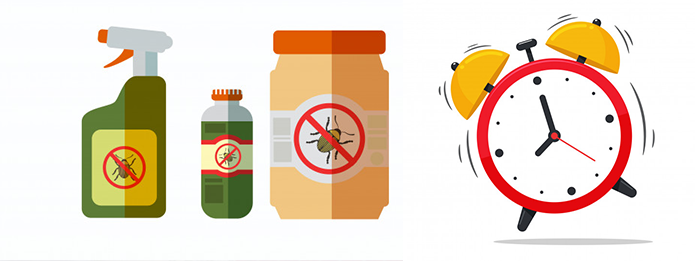How Long After Treatments Do Cockroaches Die?

Cockroaches may take up residence in houses or commercial establishments. They are well equipped to avoid detection, but once discovered, cockroach removal in Cambridge should take place immediately. Cockroaches can expose human beings to dangerous pathogens and they are difficult to kill using do-it-yourself methods.
While treatments are effective at killing cockroaches, they do not take full effect immediately. You should know what to expect after treatments take place so that you are not alarmed if you continue to see roaches around your home.
How Long After Treatments Do Cockroaches Die?
For a few days after treatment, you may see more cockroaches than ever. This does not mean that the treatment did not work. On the contrary, it means that the treatment worked exactly the way it was supposed to. The roaches are coming out of their hiding places specifically because they are dying after having been exposed to the insecticide in the spray.
It’s not clear why cockroaches come out in the open to die. It has been theorized that the chemicals used in insecticide cause muscle spasms and disorientation in roaches before finally killing them. Eventually, the insecticide in the spray should be effective at killing all the roaches in your home. However, this is a process that can take several weeks.
There are different factors that affect how long it takes cockroaches to die after treatment. The species of roach involved makes a difference. For example, it can take up to five weeks to completely rid your property of German cockroaches following treatment. However, during the first week alone, their numbers should reduce by 70% to 80%. The extent of the infestation also makes a difference. It may take longer for a severe infestation to be completely eradicated and may even require several treatments to resolve completely.
How Does Treatment Affect Cockroach Eggs?
Left to their own devices, cockroaches can produce hundreds of eggs during their lifetimes. Therefore, it is likely that some eggs have already been laid at the time of treatment. The treatment does not kill the roach eggs themselves, but the treatment prevents the young from reaching full maturity after they hatch.
Therefore, you may see immature cockroaches following treatment. However, these will die without breeding, and soon you will see no more cockroaches at all.
What Should You Do After Treatment?
The first thing you should do after cockroach treatment is to vacuum up the bodies of the dead and dying bugs. This helps keep the premises clean and prevents the spread of disease. It is okay to vacuum up the roaches even if they are not quite dead yet. They will not survive exposure to the insecticide, and heat from the vacuum cleaner can help kill them more quickly.
While the infestation is in its final days, you can help accelerate the end of it, and prevent the start of another one, by cleaning and decluttering. You should get rid of sources of food and water, such as food spills, garbage, and plumbing leaks, and remove places where roaches could hide.
Another way to prevent a new infestation is to determine how they got into the house in the first place so you can seal up the entry point. This can be difficult since roaches can fit into extremely small spaces. If you aren’t sure how the roaches got in, you should seal up cracks around windows and doors. If you purchase any second-hand items, you should inspect them for roaches first to avoid unwittingly carrying them into the house. This can also help you guard against other insect pests, such as bed bugs.
Trusted Providers of Cockroach Removal in Cambridge
Our Truly Nolen technicians can assess your individual situation and explain in detail how long it will take for the treatment to work fully. Find out more about the control methods we use.